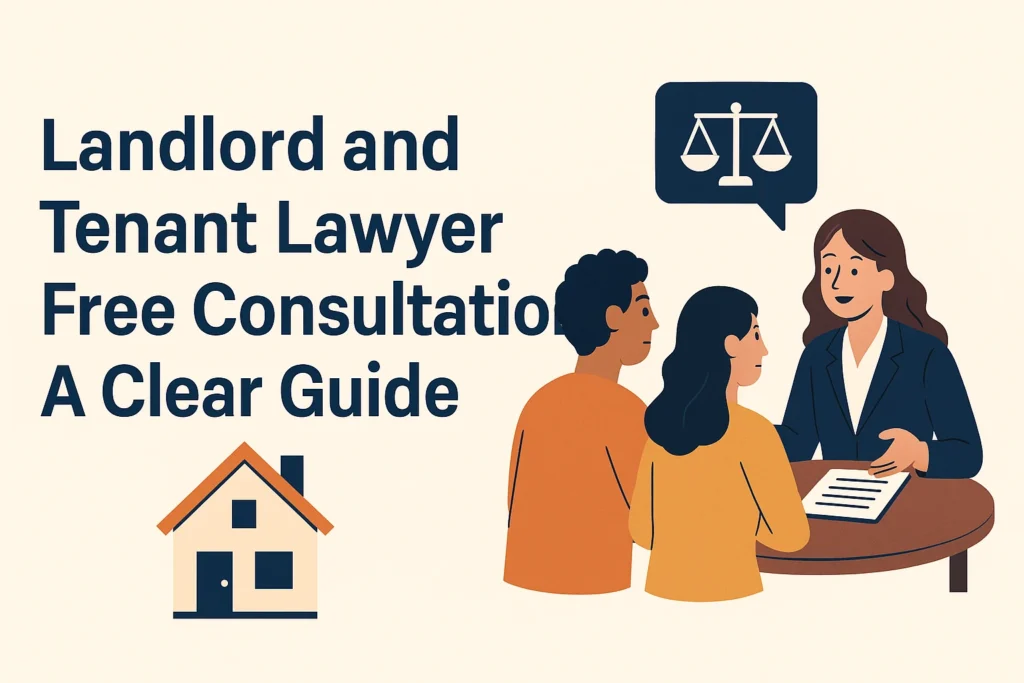Landlord and tenant fight over empty bank balances and test nerves. Bills from lawyers push stress higher. A no‑cost legal session gives a fast, calm, and clear road map. This guide walks both sides through the steps to claim that first slot and sets clear next moves.
A free hour will not cure each legal wound, yet it lays solid ground. You gain a sharp view of rights and duties before large invoices land. One frank chat with an expert can halt rash acts and plug further loss. Good prep turns that brief slot into gold.
Tenants learn if the state code allows rent escrow or urgent repair orders. Landlords learn how to serve notice that holds in court. Both sides exit the room armed with facts and options, not fears and guesses.
Time is cash. Book fast once a dispute sparks. The tips ahead will make that call easy.
What Is a Free Consultation?
A free consultation is a short, no‑cost talk with a lawyer. Most offices set aside up to forty minutes, and the talk stays private under the rules of confidentiality. The lawyer listens to the facts, reads any papers you carry, and lists clear next steps. No fee applies, and no duty to hire follows the visit.
The meeting works both ways. The lawyer checks the strength of the claim and sees if the firm has the time and skill for the job. You judge the lawyer’s grasp of landlord‑tenant law, note the style of advice, and learn the rate plan. A good fit can lead to full representation.
Clients often ask, What papers should I take? Take the lease, any notice letters, repair photos, and proof of payment. These items give the lawyer a fast map of the dispute. Clear facts let the lawyer spot solid claims and weak spots in minutes.
Expect direct questions. The lawyer may ask about past rent delays, any code violations, or prior legal action. Precise answers build trust and help the lawyer craft sound advice. Cost stays at zero unless you choose to move ahead. If the lawyer offers a fee deal, read it at home and weigh other quotes. No rule forces you to sign on the spot.
Not every case earns a yes. The lawyer may reject matters outside the firm’s focus or those with slim odds. That still doesn’t help. You now know the hurdles and can seek a new plan or another firm. A free consultation gives a safe first step, a fast scan of rights, and a chance to save cash. Use it well, and you leave the office stronger than when you walked in.
Why Free Help Matters
State rules differ on nearly every lease point. One state may void a lease after five days of non‑payment. Another may grant a full month to cure. A free talk maps out these local laws so each step stays safe.
Early advice shields later claims. A wrong notice or a missed deadline can bar a suit. A lawyer spots each limit in minutes. Tenants learn whether rent escrow is legal in that city. Landlords learn the exact time frame for a valid notice to quit.
Cost control matters as much as legal merit. Court action drains cash fast. Motions, service fees, and expert proof add weight to each bill. A no‑cost session keeps guidance within reach of small firms and low‑income renters. Sound counsel at the start can save months of fees.
Early legal aid lifts the tenant’s voice at the table. A landlord hears a clear stance backed by statute, not raw emotion. Strong knowledge pushes both sides toward a fair settlement.
Peace of mind carries real value. Stress harms health and hurts work. A free chat draws a line under doubt and points toward calm.
Where to Find a Free Consultation
Local bar groups list lawyers who give free slots. Many host an online form that asks for basic case facts. A quick web search shows phone numbers, email links, and walk‑in hours.
Legal aid centers also assist renters with low funds. Staff lawyers focus on tenant rights and fair housing laws. Renters who meet income rules can book a no‑cost slot after a brief test.
Several law schools run clinics open to the public. Senior students, under close faculty watch, meet clients, review papers, and draft letters or court forms. Service quality often rivals private counsel.
Tenant unions often plan weekly legal nights. Volunteer lawyers answer direct questions and give clear road maps. Union staff can set later dates with pro bono firms if the case needs more work.
Court halls host help desks beside the clerk’s window. Duty lawyers guide visitors on notice rules, case fees, and local time limits. Advice stays brief yet sharp and free.
National sites such as Avvo or LegalZoom list lawyers who agree to one free call. A user fills a short intake form and picks a time slot. This route suits tenants in rural zones where local firms are scarce.
Local libraries post flyers from bar drives and pro bono days. A quick call to the reference desk can reveal the next free clinic date. Good timing saves a wasted trip and secures a valuable seat.
How to Prepare for the Session
Gather each document tied to the dispute. Lease, notice, receipt, and photo prove facts better than words. Sort the stack in date order to save time. Add neat labels so the lawyer can scan each page in seconds.
Store a second set of clear scans on a phone or tablet. Digital copies act as backup if a page gets lost. Bright images help the lawyer read small print on the spot.
Write a one‑page timeline. Mark the day of the rent demand, the day the first leak appeared, and each repair request. Add the date of every reply from the landlord. A tight chain of dates lets the lawyer see strong claims at a glance.
List firm goals before you walk in. State if you want a rent refund, extra days to move, or a full repair order. Sharp aims steer the talk and stop the rift.
Carry a pad and a pen. Note each step the lawyer suggests. Fresh notes fix the plan in your mind after you leave. Speak facts, not emotions. Courts value proof over anger. A calm voice speeds the session and builds trust.
Questions to Ask the Lawyer
Ask if the state code allows rent escrow or rent hold‑back. Some states let tenants place unpaid rent in court until repairs occur. Other states treat any withheld rent as a breach that sparks eviction. The lawyer can cite the exact statute and warn of hidden traps. A clear answer can stop late fees and reduce risk.
Ask about each deadline to sue. Every claim lives under a strict time bar. One state may grant four years, another may allow one. A missed date can kill the case, no matter how strong your proof. The lawyer can mark the last safe day to file and list steps to pause the clock if the law allows.
Ask about all fee paths if you hire the firm. Some lawyers quote a flat sum. Others bill by the hour. Get the rate, court costs, and any extra charges in plain words. A firm figure avoids shock when the first invoice arrives.
Ask how updates will reach you. Many firms send brief notes by email and formal letters by mail. A clear plan for contact builds trust and keeps doubts low.
Limits of Free Sessions
Advice stays brief. Complex facts often need paid study. A lawyer may scan your lease, yet may not read each page in full. Charts, repair logs, or expert reports may wait until you sign a fee deal. Only broad options fit inside the time slot. Deep plan or draft letters sit outside the free scope.
No duty arises after the talk ends. You stay in charge of every deadline. Court dates, notice periods, and rent due days remain on your desk. A lawyer may warn of time bars, yet the clock keeps ticking until you hire full counsel.
Slots fill fast. Late calls may miss the last seat before a hearing. Demand jumps in peak rent cycles and cold months when repairs fail. Book early once a dispute sparks, and ask the office to confirm the date in writing.
A free session carries strict limits on conflict checks. If the firm already serves your landlord, ethics rules block advice to you. The staff may learn this only after you state the parties. Have a second firm in mind in case that wall appears.
Next Steps After the Consultation
Read your notes that same day. Fresh memory gives sharp recall. Write each task the lawyer listed, such as a mold test or notice mail. Rank tasks by deadline so none slip.
Speak to at least two lawyers if the case looks large. Skill, style, and fees differ across firms. A smart choice today shapes the next months and can cut costs.
Move on to simple cures at once. Pay any due rent if that clears the breach. Repair a noise source if the lease orders are quiet. Quick moves often end the dispute before the court.
Set calendar alerts for each date the lawyer named. Courts grant little mercy on late filings. A missed day can kill a claim or defense.
Send a short thank‑you note to the lawyer. Ask for fee terms in writing if you plan to hire the firm. Keep copies of every email, receipt, and photo. Good files build strong proof and smooth the next step.
Questions and Answers
Q: How much time does a free landlord‑tenant consultation last?
Most firms offer a session that runs twenty to forty minutes, long enough to review key facts and outline first options.
Q: What papers should I take to the consultation?
Carry the lease, any notice letters, rent receipts, repair invoices, and clear photos of defects; these documents give the lawyer a full view of the dispute.
Q: Can the lawyer handle my case after the free session?
The lawyer may offer full service if the matter fits firm focus and you accept the fee terms set out in a written agreement.
Q: Does a free session create an attorney‑client relationship?
Confidentiality applies under ethics rules, yet a formal relationship begins only after both sides sign a fee pact and the lawyer agrees to act on your behalf.
Final Words
Free lawyer help offers a fast, safe map of rights and risks. One short chat can shift fear into clear action. Tenants and landlords who use that hour with care gain power and calm.
Prep shapes success. Gather each paper, list clear goals, and write crisp questions. Sharp notes and prompt follow‑up turn that free slot into real value.
Use the advice without delay. Pay rent if due, mail notice if required, and line up experts if proof is needed. Early moves show good faith and prevent extra loss.
Stay alert to each court date. Courts move on strict time tables. Mark every deadline on two calendars and set phone alerts. A missed day can erase all gains.
Knowledge breeds confidence. A clear plan guards cash, shields health, and keeps trade on track. Free advice starts the path; steady steps carry you to a fair result.
Disclaimer: This article offers general legal information. It does not create an attorney-client relationship. Always consult a qualified lawyer for advice on your specific situation.



